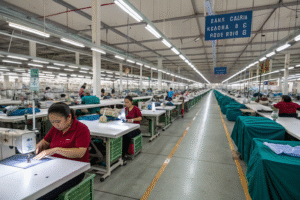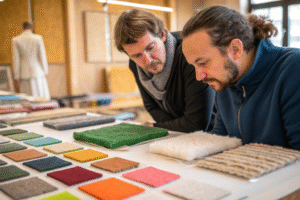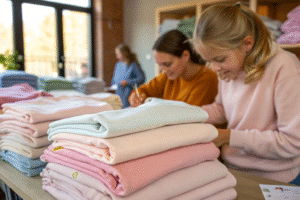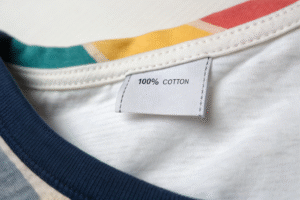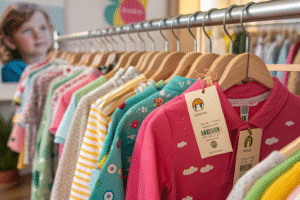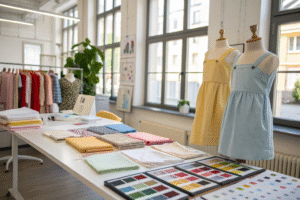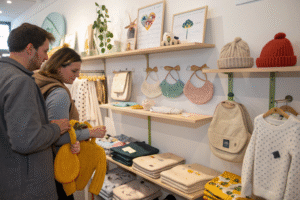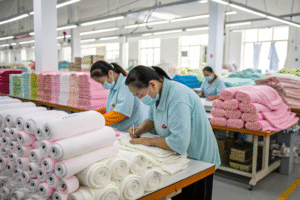Launching a kidswear business online can be exciting and profitable—especially with rising demand for stylish, safe, and affordable children’s clothes.
To start an online kid’s garment business, define your niche, set up a store, source quality products, and build a social media-driven marketing strategy.
This guide walks you through the key steps to build a kidswear brand that grows with confidence and connects with modern parents.
How to Choose the Right Niche in Kids’ Fashion?
The kidswear market is large, so success starts with narrowing your focus. You need to stand out—and speak clearly to a specific customer.
Choose a niche that solves a need, reflects your values, and matches current trends—like organic babywear, matching family sets, or gender-neutral basics.

What are some profitable kidswear niches?
| Niche | Products Examples | Target Customer |
|---|---|---|
| Organic/Eco-friendly wear | GOTS cotton bodysuits, bamboo pajamas | Health-conscious parents |
| Cultural or Ethnic wear | Festive sets, traditional prints | Diaspora families, holiday buyers |
| Matching outfits | Sibling or parent-child sets | Gift shoppers, Instagram parents |
| Special needs/adaptive wear | Sensory-friendly tees, magnetic closures | Parents of children with disabilities |
| Occasion wear | Birthday sets, wedding outfits | Premium buyers, event planners |
How to validate your niche?
- Check Google Trends for demand growth
- Review bestsellers on Etsy, Amazon, or Instagram
- Survey parents or join parenting groups for feedback
- Test products in small batches to gauge interest
Your niche will define your branding, product design, pricing, and marketing. Choose it with purpose.
What You Need to Launch an Online Kidswear Store?
Once your niche is set, it’s time to build your brand and prepare your business to go live.
To launch a kidswear store online, you need a brand name, a domain, product photos, a payment-ready website, and a launch-ready marketing plan.
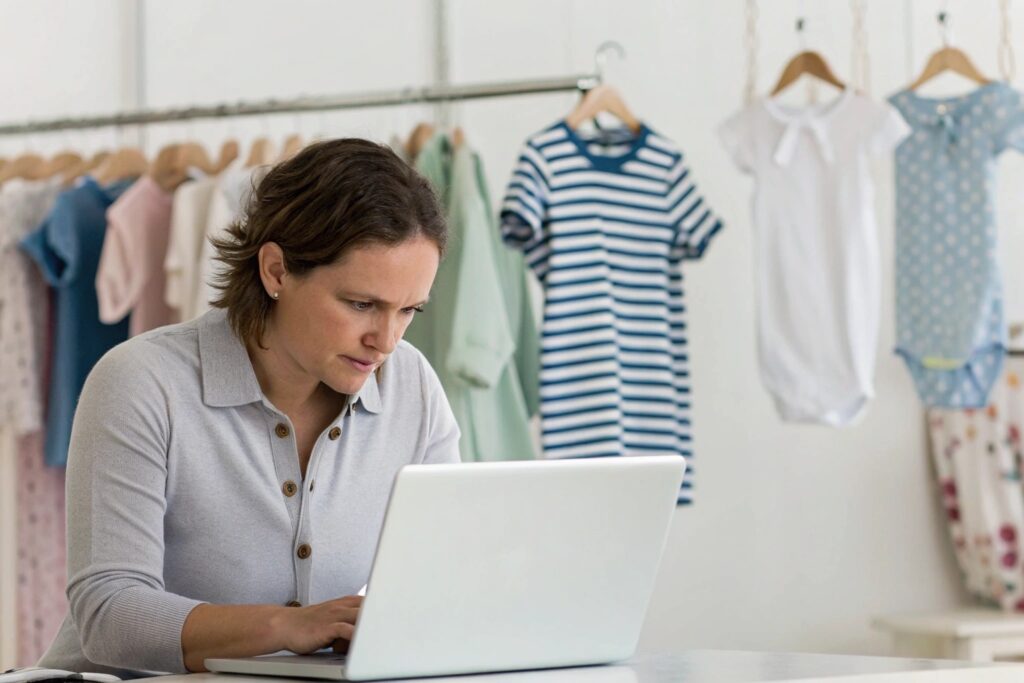
What’s on your launch checklist?
| Task | Why It’s Important |
|---|---|
| Brand name and logo | Build recognition and trust |
| Business registration | Legal compliance and payment setup |
| E-commerce platform (Shopify, Etsy, etc.) | Your online storefront |
| Product listings | Photos, descriptions, size info |
| Packaging | Helps with presentation and returns |
| Payment gateway | Accepts credit cards, PayPal, etc. |
| Shipping plan | Pricing and delivery timelines |
A simple 3–5 product launch is often enough to get started. Focus on bestsellers and sizes from 0–3Y or 2T–5T to capture common parent needs.
Tools to make launch easier:
- Canva – Design banners, labels, and graphics
- Printify or Printful – Print-on-demand if you’re testing designs
- Shopify – Recommended for its user-friendly backend
- Pixc or Fotor – Improve product photo quality
- Klaviyo – Start simple email flows for welcome and follow-up
At Fumao, we help brands build product catalogs, size charts, and factory-ready samples so they launch with confidence.
Where to Source Quality Kids’ Garments for Your Brand?
Finding reliable manufacturers is key to delivering quality and growing your brand reputation—especially in babywear where safety matters.
You can source kids’ garments from wholesale marketplaces, private-label factories, or custom OEM manufacturers depending on your budget and brand goals.

What sourcing options are available?
| Sourcing Method | Pros | Cons |
|---|---|---|
| Wholesale from suppliers | Fast and easy | Limited branding, less control |
| Private label | Add your logo to existing styles | Moderate MOQ, limited customization |
| OEM (custom manufacturing) | Total design freedom, scalable | Requires planning, higher startup |
| Dropshipping (e.g., Printify) | Low risk | Less quality control, slower delivery |
If your brand focuses on softness, safety, or unique sizing—you’ll want a factory partner like Fumao who offers:
- OEKO-TEX® or GOTS certified fabrics
- Babywear-specific stitching and trims
- Flexible MOQ (starting from 300 pcs/style)
- Custom labels, packaging, and size grading
How to choose the right supplier?
- Ask for fabric certificates and sample photos
- Request a sample set before bulk ordering
- Check reviews or get referrals from other brands
- Confirm lead times and payment terms clearly
We always recommend starting with 1–2 SKUs for your first order to manage risk and build trust with your factory.
Tips for Marketing Your Kidswear Business on Social Media?
Social media is one of the most effective tools to reach modern parents—and to create the emotional connection needed to drive sales.
Market your kidswear brand with visual storytelling, parent-focused content, influencer collaborations, and consistent posting on Instagram, TikTok, and Pinterest.
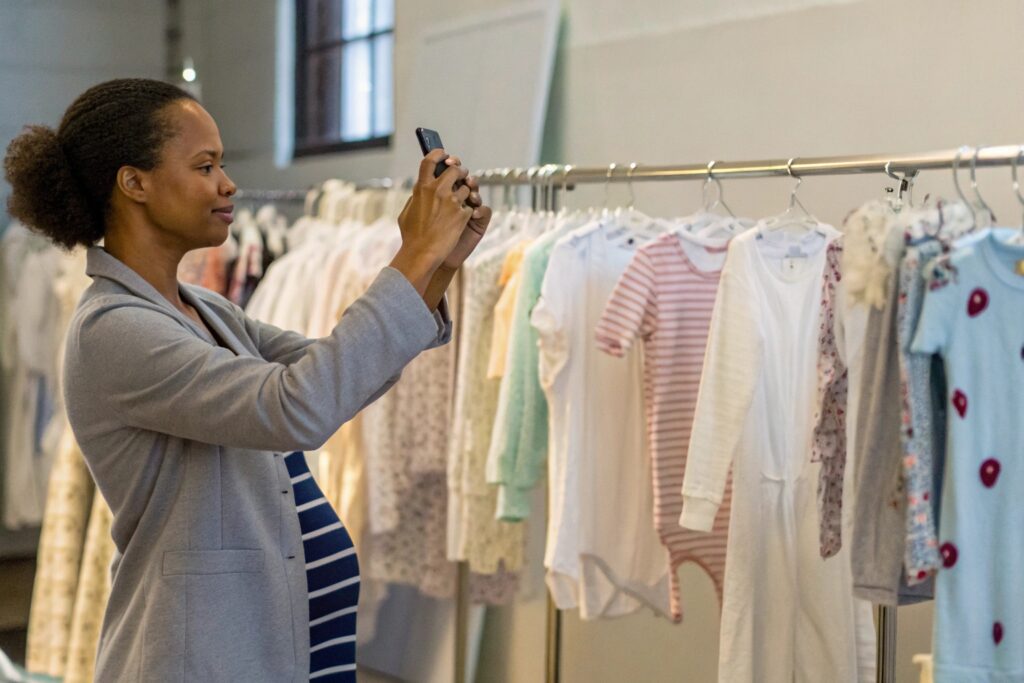
What content performs best for kidswear?
| Content Type | Why It Works |
|---|---|
| Lifestyle baby photos | Builds emotional appeal |
| Behind-the-scenes posts | Shows care and quality in production |
| Customer testimonials | Builds trust through real parents |
| Short reels or TikToks | Engaging, shareable, drives traffic |
| Educational posts | Tips for sizing, fabric care, parenting |
Use storytelling: explain why you started the brand, what makes your clothes safe, or how your fabric choices support babies’ skin.
How to grow your audience?
- Partner with mom bloggers or micro-influencers
- Use hashtags like #newbornstyle, #babysfirstoutfit, #organicbabywear
- Offer referral discounts or affiliate codes
- Run giveaways during holidays or collection launches
- Share user-generated content (UGC) from customers
One of our clients grew 1,000 followers in their first month just by reposting customer photos and tagging baby brands in their niche.
Conclusion
Starting an online kid’s garment business is completely achievable with the right niche, platform, supplier, and marketing. Focus on quality, connection, and consistency—and you’ll build a kidswear brand that lasts.


